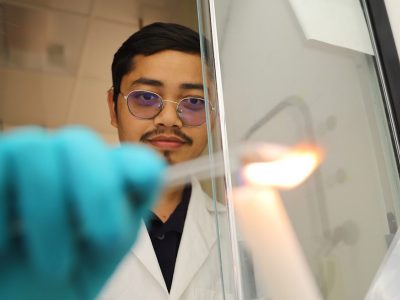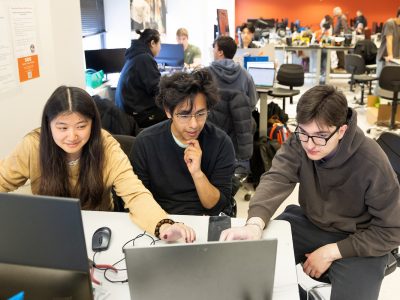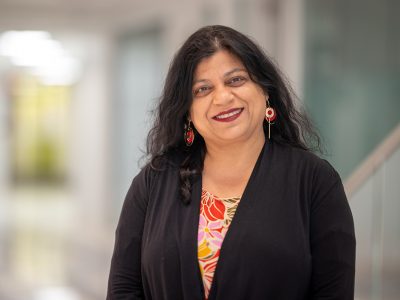Two professors in the College of Arts and Sciences were awarded grants from the National Science Foundation (NSF) for their ongoing work with homological algebra.
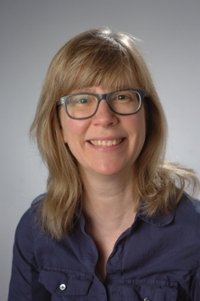
Professor Claudia Miller’s project is titled “Homological approaches to differential forms, differential operators and transfer of algebra structures.”
Scholars have long used algebra to study unsolved questions from geometry, such as how investigators can find measures of singularity. A singularity is a place on a curve, surface or higher dimensional space where it is not smooth—that is, it has a sharp point or crosses itself. Highly complex abstract structures are easier to understand and visualize in the smooth setting, and singularities present challenges and complexities.
The structural backbone given by algebraic geometry and commutative algebra can help investigators understand how to measure how extreme a singularity is or how far it is from being smooth. Miller will use homological methods to gain insight into these problems, helping investigators understand how to measure the extremity of a singularity, extracting information and presenting it as a visible mathematical object.
She will deploy differential forms and operators to characterize smoothness and create new algebraic structures that yield not only invariants but also tools to discover new invariants. This work on singularities can lead to applications in computer vision and medical imaging, and has connections to string theory in physics.
For the Spring 2024 semester, Miller was selected for a prestigious research professorship at the Simons Laufer Mathematical Sciences Institute in Berkeley, California. She will be on site at the institute for a semester of talks and research activities. The intense program is reserved for distinguished mathematicians to collaborate on cutting-edge topics. She will participate in seminars and workshops, exchange ideas with other researchers in residence and mentor postdoctoral fellows. The NSF grant will enable her to travel the semester beforehand and the summer after the program to work with colleagues at other universities, both in preparation for the intense program and to continue work begun there. It will also enable her to invite visitors to Syracuse to speak on their work, exchange new ideas and provide exposure for the large group of Ph.D. students in algebra in the department.
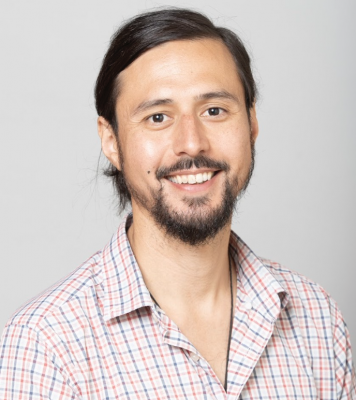
Professor Josh Pollitz’s project is titled, “Homotopical methods and cohomological support in local algebra.”
Algebraic geometry is a central branch of modern mathematics, focusing on the study of systems of polynomial equations, which are objects that are fundamental throughout mathematics. But when polynomial equations reach higher dimensions with increased numbers of variables, the shapes of algebraic geometry become harder to visualize. Commutative algebra provides a framework or language for seeing and understanding the properties of shapes in higher dimensional algebraic geometry.
Pollitz will investigate singularities in commutative algebra through the lens of various homological constructions. Homological algebra is the study of certain structures in math and how they correspond.
A highly complex equation is easier to visualize when it is smooth. But a singularity, a sharp point or crossing in an otherwise smooth surface of a higher-dimensional mathematical object, makes visualizing the equation’s shape more difficult. Homological tools can help investigators understand how to measure the extremity of a singularity, extracting information and presenting it in the form of a visible mathematical object. This research could have potential applications in a variety of mathematical areas, as well as real-world applications through fields such as cryptography.
He plans to use the NSF grant to travel and speak about his research at universities and increase the visibility and strength of Syracuse’s Algebra Research Group, which meets weekly and brings in outside speakers with new ideas and encourages graduate students to travel and speak at conferences. This grant, which can be difficult for early-career investigators to secure, will support postdocs, graduate and undergraduate student research. A long-term goal of the grant is establishing Syracuse University as a hub for commutative algebra and algebraic geometry.
Story by John H. Tibbetts

